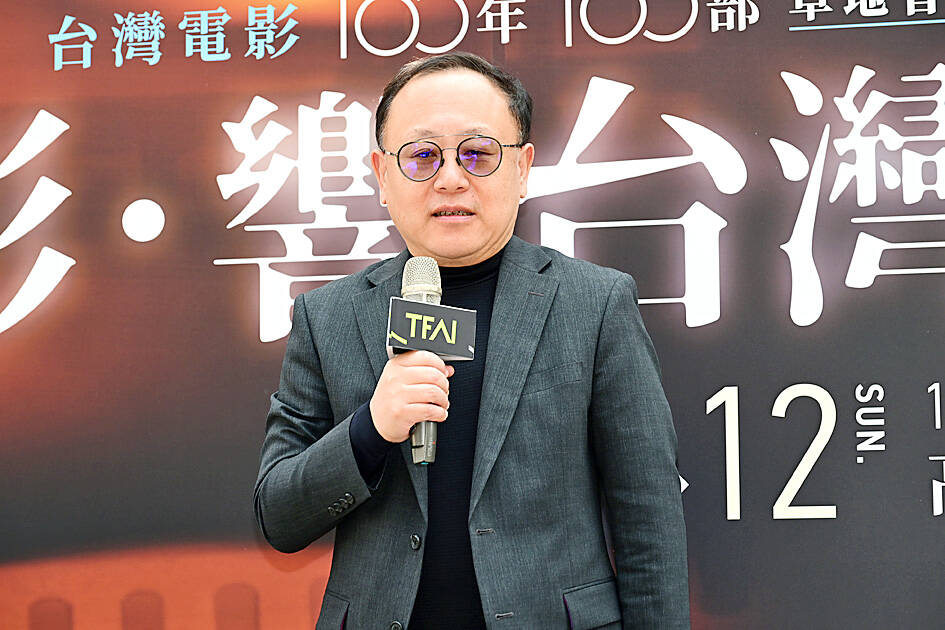The Ministry of Culture has started accepting applications for a subsidy program to aid Taiwanese dramas seeking to enter international markets.
The Cabinet last month approved a budget for the ministry’s “one plus four T-content plan,” which includes NT$3 billion (US$94.1 million) for next year and NT$10 billion for next year to 2027, the ministry said.
The plan, also referred to as the “Cultural Kuroshio Current,” is centered on art, publishing, cultural creativity, audiovisual works, cultural technology and cultural diplomacy, it said.

Photo: Chen Yi-kuan, Taipei Times
The plan’s first program focuses on promoting the audiovisual industry by soliciting internationally oriented Taiwanese dramas. Applications can be submitted until Dec. 4.
It aims to bolster Taiwan’s content production capacity, support and develop large-scale production companies, foster talent, improve technology, and enhance the competitiveness and influence of Taiwanese content, it said.
The program is looking for international and market-oriented productions that present investment term sheets from domestic and foreign investors — such as international enterprises, TV stations, production companies or streaming platforms — and a specific international marketing plan, it said.
The theme of the drama should be unique and international, and those that represent Taiwanese history and culture are preferred, it said.
A proposed drama series should have a planned production cost of at least NT$10 million per episode, or a total cost of more than NT$100 million, it said.
More than one-fifth of the drama’s production team, such as producers, directors, screenwriters and actors, should consist of people shortlisted for or winners of a Golden Bell Award, Golden Horse Award, or other international film and television awards, it said.
The program combines subsidy and investment for additional funding.
After the ministry reviews an application for the program, the Taiwan Creative Content Agency would conduct an investment review, which is under a separate program under the National Development Fund, it said.
Applications that pass both reviews can receive a subsidy of up to 40 percent of the estimated production cost approved by the ministry, it said.
The program plans to solicit applications every season to provide continued support for the industry, the ministry said.
“In the era of digitalization, Taiwan is no longer an outlier or a small country, but has the unprecedented right to address the world,” Minister of Culture Shih Che (史哲) said.
Countries worldwide can spread their cultural content through over-the-top media services, which are the highways that connects the world, he said.
With growing global attention being drawn to Taiwan, the Cultural Kuroshio Current strives to put Taiwan’s cultural content on those highways to bring entertainment to the world, he said.

Taiwan is to commence mass production of the Tien Kung (天弓, “Sky Bow”) III, IV and V missiles by the second quarter of this year if the legislature approves the government’s NT$1.25 trillion (US$39.78 billion) special defense budget, an official said yesterday. Commenting on condition of anonymity, a defense official with knowledge of the matter said that the advanced systems are expected to provide crucial capabilities against ballistic and cruise missiles for the proposed “T-Dome,” an advanced, multi-layered air defense network. The Tien Kung III is an air defense missile with a maximum interception altitude of 35km. The Tien Kung IV and V

The disruption of 941 flights in and out of Taiwan due to China’s large-scale military exercises was no accident, but rather the result of a “quasi-blockade” used to simulate creating the air and sea routes needed for an amphibious landing, a military expert said. The disruptions occurred on Tuesday and lasted about 10 hours as China conducted live-fire drills in the Taiwan Strait. The Civil Aviation Administration (CAA) said the exercises affected 857 international flights and 84 domestic flights, affecting more than 100,000 travelers. Su Tzu-yun (蘇紫雲), a research fellow at the government-sponsored Institute for National Defense and Security Research, said the air

Taiwan lacks effective and cost-efficient armaments to intercept rockets, making the planned “T-Dome” interception system necessary, two experts said on Tuesday. The concerns were raised after China’s military fired two waves of rockets during live-fire drills around Taiwan on Tuesday, part of two-day exercises code-named “Justice Mission 2025.” The first wave involved 17 rockets launched at 9am from Pingtan in China’s Fujian Province, according to Lieutenant General Hsieh Jih-sheng (謝日升) of the Office of the Deputy Chief of the General Staff for Intelligence at the Ministry of National Defense. Those rockets landed 70 nautical miles (129.6km) northeast of Keelung without flying over Taiwan,

A strong continental cold air mass is to bring pollutants to Taiwan from tomorrow, the Ministry of Environment said today, as it issued an “orange” air quality alert for most of the country. All of Taiwan except for Hualien and Taitung counties is to be under an “orange” air quality alert tomorrow, indicating air quality that is unhealthy for sensitive groups. In China, areas from Shandong to Shanghai have been enveloped in haze since Saturday, the ministry said in a news release. Yesterday, hourly concentrations of PM2.5 in these areas ranged from 65 to 160 micrograms per cubic meter (mg/m³), and pollutants were